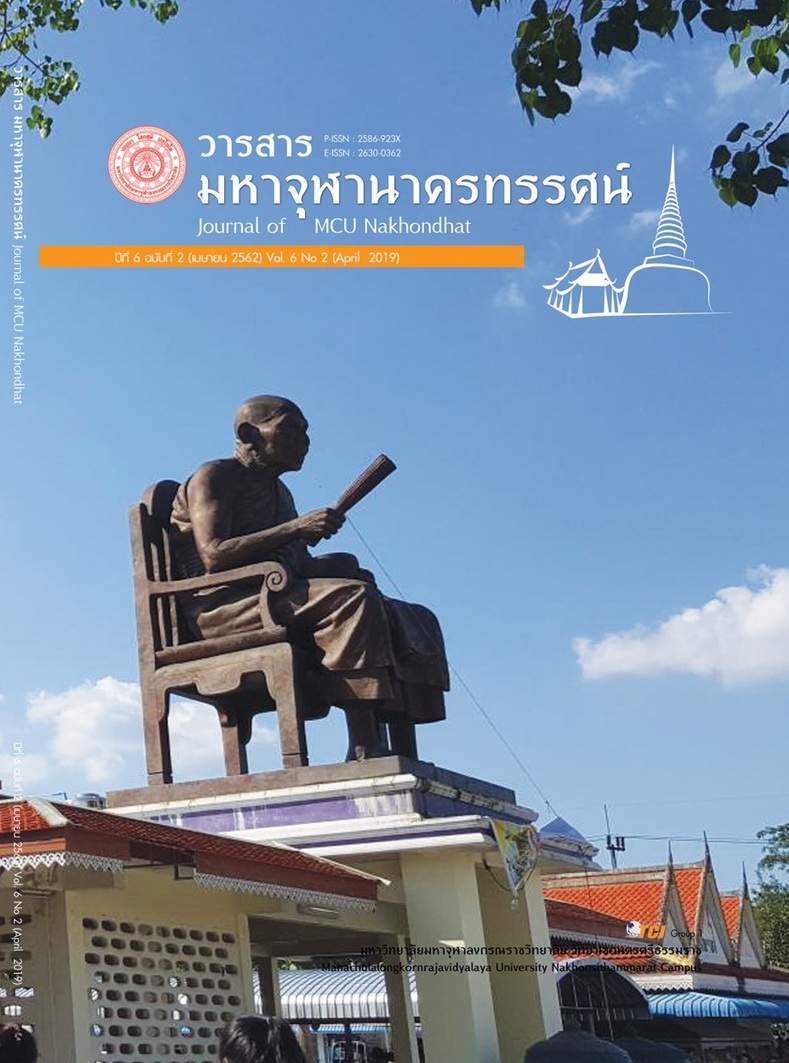A MODEL OF TEACHING SKILLS DEVELOPMENT OF TEACHERS IN BORDER PATROL POLICE SCHOOLS BASED ON BUDDHIST EDUCATIONAL ADMINISTRATION
Main Article Content
Abstract
The objectives of this research were; 1) to study the state of teaching skills based on Buddhist educational administration of teachers in Border Patrol Police Schools, 2) to develop a model of teaching skills based on Buddhist educational administration of teachers in Border Patrol Police Schools, and 3) to propose the model of teaching skills development based on Buddhist educational administration of teachers in Border Patrol Police Schools. The mixed research methodology was used in the study. The qualitative data were collected from documents, in-depth interviews.
The research results found that;
1. The state of teaching skills of teachers in Border Patrol Police Schools, 1) The number of teachers did not cover the teaching loads and mostly their educational backgrounds and qualifications were not relevant to educational career, 2) The teachers lacked of teaching skills and methods, and 3) Teachers’ qualifications and numbers were not relevant to course subjects and numbers of students. Solutions; 1) To recruit the qualified officials to the duty, 2) To arrange training courses in teaching methods and skills for the teachers, 3) To arrange teacher meetings for exchanging ideas, techniques, and methods in teaching and in problem solving, and 4) The teachers should have regular and continuous trainings in teaching and learning process.
2. The development of a model of teaching skills development of teachers in Border Patrol Police Schools based on Buddhist educational administration consisted 4 components; 1) Principle, 2) Objective, 3) Operation process consisting of (1) Teaching skills factor, (2) Teaching skills development method, (3) Skills enhancement activity, and 4) Achievement condition.
3. The result of examination and evaluation of the model of teaching skills based on Buddhist educational administration of teachers in Border Patrol Police Schools was at a high level overall. The highest level was on appropriateness, followed by accuracy, feasibility, and usefulness respectively.
Article Details
References
Krejcie, R. V. & Morgan, D. W. (1970). Determining Sample Size for Research Activities. Educational and Psychological Measurement, 30(3), 607-610.
คม ชัด ลึก. (17 มกราคม 2561). "ศึกษาความเท่าเทียม ความหวังครู ตชด". เข้าถึงได้จาก https://www.komchadluek.net/news/crime/89360
จิตรา มีคำ. (2556). ปัญหาและแนวทางการบริหารจัดการโครงการส่งเสริมคุณภาพการศึกษาของโรงเรียนตำรวจตระเวนชายแดนสังกัดกองกำกับการตำรวจตระเวนชายแดนที่ ๓๑ ในพื้นที่จังหวัดพิษณุโลก. คณะวิทยาการจัดการ มหาวิทยาลัยราชภัฏพิบูลสงคราม.
นงลักษณ์ วิรัชชัย และสุวิมล ว่องวาณิช. (2541). การสังเคราะห์งานวิจัยทางการศึกษาด้วยการวิเคราะห์อภิมานและการวิเคราะห์เนื้อหา. กรุงเทพมหานคร: สำนักงานคณะกรรมการศึกษาแห่งชาติ สำนักนายกรัฐมนตรี.
พิเชษฐ์ โพธิ์ภักดิ์. (2553). การพัฒนารูปแบบการบริหารโรงเรียนนิติบุคคล สังกัดสำนักงานคณะกรรมการการศึกษาขั้นพื้นฐาน. ใน ครุศาสตรดุษฎีบัณฑิต สาขาการบริหารการศึกษา. จุฬาลงกรณ์มหาวทิยาลัย.
สำนักงานโครงการสมเด็จพระเทพรัตนราชสุดาฯ สยามบรมราชกุมารี. (2559). สถานศึกษาในโครงการพัฒนาเด็กและเยาวชน ปีการศึกษา 2559.
สุภางค์ จันทวานิช. (2540). วิธีวิจัยเชิงคุณภาพ. กรุงเทพมหานคร: จุฬาลงกรณ์ราชวิทยาลัย.


